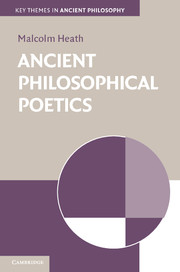Chapter One - Poetry
The roots of a problem
Published online by Cambridge University Press: 05 December 2012
Summary
Archaic poetry
One of the earliest surviving Greek poems describes the poet’s encounter with the Muses. While Hesiod was tending his sheep on the slopes of Mount Helicon, the goddesses ‘taught him beautiful song’, gave him a staff (the characteristic accoutrement of the poetic performers known as rhapsodes), breathed a divine voice into him, and commissioned him ‘to hymn the race of blessed immortals’. In the course of this encounter, the Muses say (Theogony 26–8):
Shepherd bumpkins! Utter disgraces! No more than bellies! We know how to tell many falsehoods resembling real truths, and we know, when we choose, how to sing true things.
These puzzling words, by turns mocking and cryptic, are commonly understood as endorsing the truthfulness of Hesiod’s poem. But why, in that case, would Hesiod have advertised his patrons’ deceptive potential? One possibility is that he needed to explain discrepancies between his own and others’ poems. If so, there is no attribution of authority to poetry in general: Hesiod claims a special (though not necessarily unique) authority for his own poetry. But this claim to authority depends on three premises which there is no reason to grant: that Hesiod is telling the truth about his encounter with the Muses; that he correctly understood the Muses’ words as a promise to tell him the truth; and that the Muses made that promise truthfully. The first two premises are unsupported; the Muses’ own words undermine the third. An audience might reasonably view the content of Hesiod’s poetry agnostically, therefore. So might Hesiod himself. In attributing these words to his Muses he acknowledges the uncertainty inherent in any human attempt to account for the origins of the universe and the history of the gods. These are matters beyond direct human knowledge, exceeding our capacity to distinguish truth from plausible falsehood. We are dependent on insights that come from outside us, and cannot confidently pass judgement on the authenticity of what we receive.
- Type
- Chapter
- Information
- Ancient Philosophical Poetics , pp. 4 - 8Publisher: Cambridge University PressPrint publication year: 2012



